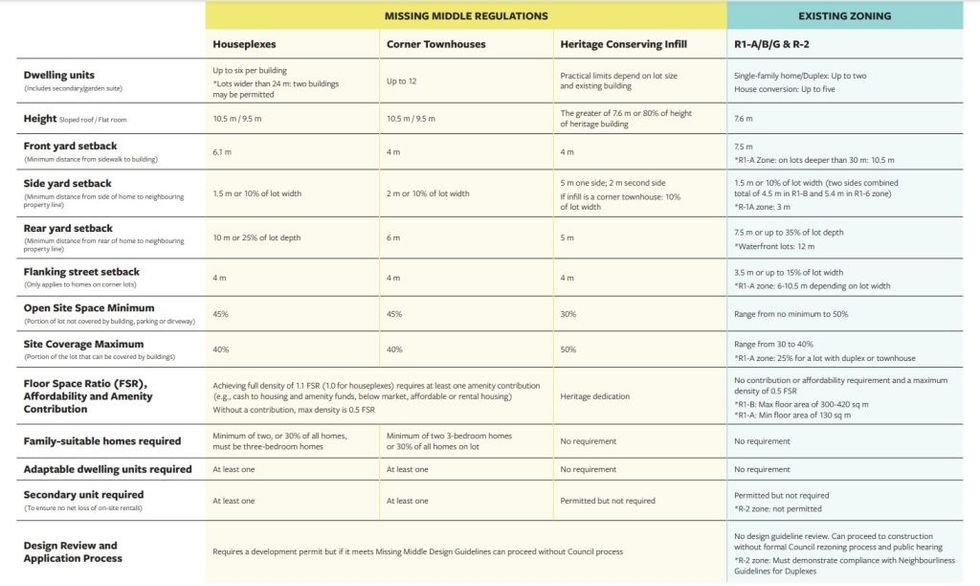After an extensive process that included a years-long engagement period and multi-day public hearing, Victoria passed its Missing Middle Housing Initiative late Thursday evening.
The Initiative allows for up to six units of housing -- including townhouses and duplexes -- on lots currently zoned for single-family homes.
According to the City, its Official Community Plan already allows for missing middle housing, but because a majority of Victoria is currently zoned for single-family homes, going that route requires rezoning. The Missing Middle Housing Initiative amends existing bylaws and land-use policies to allow these forms of housing to be permitted without rezoning and Council approval.
"This helps explain why Victoria sees many older homes replaced by new, more expensive single-family homes far more often than Missing Middle housing is created," the City says.
The intent is to increase housing diversity and supply through gentle densification, rather than through high-density skyscrapers, while also expediting delivery.
The Initiative will also help conserve heritage homes by allowing other homes to be built on the same lot.

The Missing Middle Housing Initiative was born in November 2019, and was followed by an engagement period that lasted most of 2020 and 2021. Bylaw amendments were drafted and presented to City Council in May 2022, before a multi-day public hearing was held in August and September.
The Initiative was then put on hold due to the October municipal elections, which saw Marianne Alto ultimately win the mayoral seat after Lisa Helps opted against seeking re-election. On Thursday, Helps was appointed by BC Premier David Eby as a Housing Solutions Advisor that will work with the Ministry of Housing to rollout the BC Builds program Eby outlined during his campaign, which would also make use of upzoning.
The Missing Middle Housing Initiative ultimately passed with a 6-3 vote. City Councillors Jeremy Caradonna, Dave Thompson, Susan Kim, Krista Loughton, Matt Dell, and Mayor Marianne Alto voted in support of it, but Councillors Chris Coleman, Marg Gardiner and Stephen Hammond were opposed to it.
"This is going to create a big change in Victoria," said Councillor Dell, who voted in favor of it. "And I think a lot of that change is for the better -- [and] bring in more housing -- but I think people are rightfully concerned about their neighbourhood [and] what they'll look like."
Those who voted against the Initiative voiced frustration with the process, with Councillor Coleman unhappy with the last-minute amendments to the Initiative that were introduced and Councillor Hammond unhappy about Mayor Alto limiting the time councillors had to speak to 15 minutes.
Both were skeptical that the Initiative would really increase affordability, and many Victoria residents on Twitter were also worried that it could affect the City's greenspaces, while also being a boon for developers.
"I think Councillor Caradonna is quite right that this is not a silver bullet that addresses affordability," Councillor Hammond said.
That may very well be true, but the City has not claimed the Missing Middle Housing Initiative to be that.
The Missing Middle Housing Initiative is just one piece of the City's Victoria Housing Strategy, which has an overall goal of addressing the housing needs of residents across the housing continuum, through an assortment of initiatives and housing policies.
"No one policy on its own is expected to address all housing needs and collaboration with senior levels of government is critical," the City says of the overall strategy.
As part of another leg of the strategy, Victoria City Council passed a motion earlier this month directing staff to study a variety of short-term measures that could address housing and affordability needs. Measures that will be studied include expanding transit passes for tenants, increasing bicycle parking, as well as eliminating parking minimum requirements.
This article has been updated to correct an error regarding the October municipal election.





















